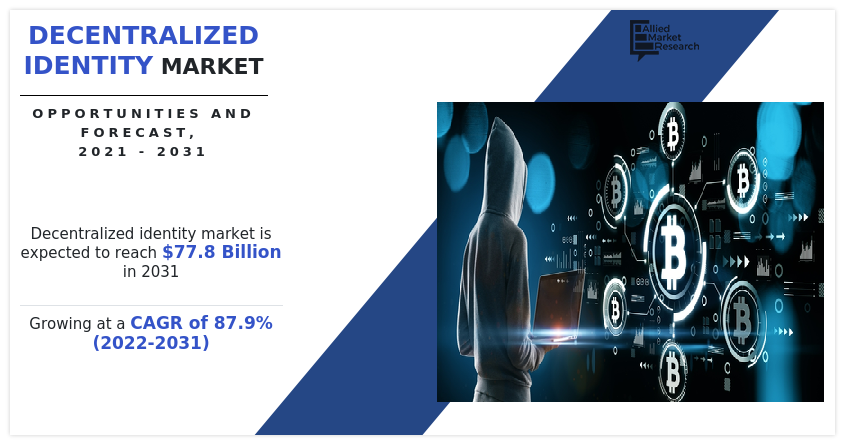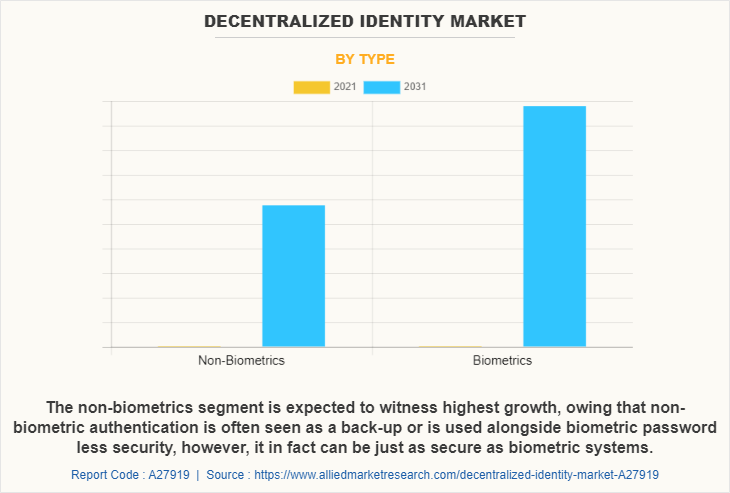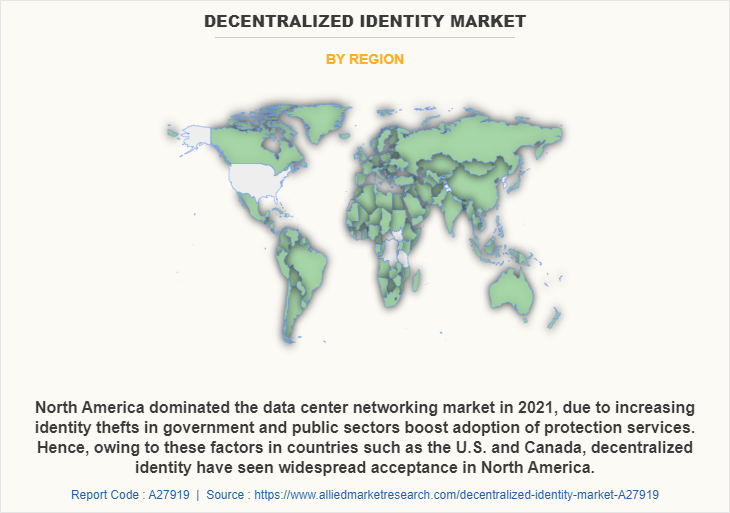Decentralized Identity Market Insights, 2031
The global decentralized identity market size was valued at USD 156.8 million in 2021, and is projected to reach USD 77.8 billion by 2031, growing at a CAGR of 87.9% from 2022 to 2031.
Rise in security breaches and increasing numbers of identity fraud and security breaches is boosting the growth of the global decentralized identity market. In addition, rise in applications of blockchain identity solutions in banks is positively impacts growth of the deception technology market. However, lack of technical expertise, and fluctuating regulatory status and a lack of rules is hampering the deception technology market growth. On the contrary, numerous uses for blockchain identity solutions, and increase in adoption of mobile device applications and platforms is expected to offer remunerative opportunities for expansion during the deception technology market forecast.

Decentralized identity is an open-standard identity authentication solution that provides a secured platform for user verification. The platform is widely operated on the basis of verifiable credentials of individuals with the help of a range of independent and transparent data exchange technology such as blockchain or other distributed ledger technology. In a digitalized platform, verifiable credential constitutes a key aspect of identity claims, and organizations issue these encrypted digital identity cards to secure identity data. Rapid incidences of cybersecurity problems and other fraudulent activities such as money laundering or bribery are quite common in the banking sector.
The decentralized identity market is segmented on the basis of component, enterprise size, end user, and region. By type, it is segmented into biometrics and non-biometrics. By enterprise size, it is categorized into SMEs and large enterprises. By end user, it is categorized into enterprise and individual. By enterprise, it is segmented into BFSI, government, healthcare, manufacturing, retail and ecommerce, IT and telecom, and others. Region wise, it is analyzed across North America, Europe, Asia-Pacific and LAMEA.
The key players operating in the Decentralized Identity Industry include 1Kosmos, Accenture, Avast, Civic Technologies, DragonChain, Finema, Hu-manity co., Microsoft Corporation, Nuggets, NuID, Persistent Ltd., Ping Identity, R3, SecureKey Technologies, Serto, ValidatedID, and Wipro Corporation. Furthermore, it highlights the strategies of the key players to improve the market share and sustain competition.
On the basis of type, the biometrics segment dominated the decentralized identity market growth in 2021 and is expected to maintain its dominance in the upcoming years. Since biometrics binds an identity to a credential and an individual, it is expected to be used by individuals as well as enterprises for verifying their identities in the coming future; this will require the use of decentralized identity solutions for efficient management and handling of the sensitive biometric credential data of individuals. Additionally, Biometric solutions follow lock and capture mechanisms to verify the individuals and further help in enabling access to a specific set of services.

Depending on the region, North America dominated the decentralized identity market share in 2021. In North America region, businesses are investing in their emerging technologies in order to improve their work efficiency. The rapidly evolving digital world requires efforts and advancements to keep up with subsequent increases in fraud and privacy concerns. A different simplified approach is needed, which understands the security model in order to keep data safe. Increasing identity thefts in government and public sectors may boost the adoption of protection services. Because of these factors the countries such as the United States, Canada, decentralized identity have seen widespread acceptance in the North America region. However, Asia-Pacific is expected to witness significant growth during the forecast period, owing to growing economies such as India and China and cloud native countries like Japan.

Top Impacting Factors
Increasing Numbers of Identity Fraud and Security Breaches
The data being posted to the web is becoming more and more vulnerable to attacks as the globe moves closer to digitalization. The fact that each consumer's personal information is stored on hundreds of servers throughout the world is contributing to an increase in identity theft. According to the Federal Trade Commission (FTC), identity fraud cases increased by about 45% globally in 2020, causing enormous financial losses. The rise in cyberattacks is attributed to technologies like machine learning (ML), which enable attackers to produce a variety of malicious code variants every day. Such new cyberattacks are constantly appearing, endangering businesses' assets, ruining their reputations, and costing them money.
As a result, protecting against cyber threats has become crucial for business expansion. This has been a spur for the expansion and adoption of decentralized identity technologies among businesses as a means of defense against security lapses and cyberattacks. Decentralized identification technology has been adopted by airports and airlines globally, enabling facial recognition check-in and contactless travel through numerous touchpoints. With this technology, travelers can use a secure, rapid, and accurate face scan to check luggage, get through security, and board a flight.
Rise in Applications of Blockchain Identity Solutions in Banks
The Internet of Things, banking, and other Decentralized Identity Industryhave a lot of promise for using blockchain identity management technologies. By resolving the numerous problems with conventional banking operations and ensuring that banking services are always available, this technology has the potential to revolutionize the globe. The efficiency and security of business transactions would increase with lower transaction costs and faster transaction times. Because blockchain technology is based on distributed ledger technology and the blocks are encrypted using strong encryption, the data is less likely to be hacked or changed without permission.
Impact of COVID-19
The current estimation of 2031 is projected to be lower than pre-COVID-19 estimates. The digital ecosystem has become increasingly important around the world. COVID-19 has resulted in significant advancements in decentralized identity technologies. Many firms have started offering online services since the onset of COVID-19. As a result, online consumers' fears about their identity security have grown, which has created demand for various digital security of data as well as people in the market. Decentralized identity is important for confirming user identities and securely storing them. Furthermore, enterprises all around the world have increased their efforts to implement decentralized identification systems. This is expected to increase overall demand for decentralized identity technology. The COVID-19 crisis had accelerated the market expansion owing to the rising rate of digital transformation among business enterprises to ensure a robust online platform for business operations.
Key Benefits for Stakeholders
- This report provides a quantitative analysis of the Decentralized Identity Market Forecast, current trends, estimations, and dynamics of the decentralized identity market analysis from 2021 to 2031 to identify the prevailing decentralized identity market opportunities.
- The market research is offered along with information related to key drivers, restraints, and opportunities.
- Porter's five forces analysis highlights the potency of buyers and suppliers to enable stakeholders make profit-oriented business decisions and strengthen their supplier-buyer network.
- In-depth analysis of the decentralized identity market segmentation assists to determine the prevailing market opportunities.
- Major countries in each region are mapped according to their revenue contribution to the global market.
- Market player positioning facilitates benchmarking and provides a clear understanding of the present position of the market players.
- The report includes the analysis of the regional as well as global decentralized identity market trends, key players, market segments, application areas, and market growth strategies.
Decentralized Identity Market Report Highlights
| Aspects | Details |
| By Type |
|
| By Enterprise Size |
|
| By End User |
|
| By Region |
|
| Key Market Players | Ping Identity, Civic Technologies, 1Kosmos, NuID, Finema, ValidatedID, Wipro Limited, SecureKey Technologies, Accenture plc, Microsoft Corporation, Persistent Ltd., Hu-manity.co, Serto, Nuggets, R3, Avast, DragonChain |
Analyst Review
In accordance with the insights by the CXOs of leading companies, the decentralized identity market is soaring due to factors such as the growing instances of security breaches and identity-related fraud, the rising need for non-human digital IDs and security in consumer goods, coupled with the increasing number of tactical initiatives by the key companies are some prominent factors that impel the global market demand. For instance, in March 2022, SecureKey was acquired by Avast with the aim of accessing Avast decentralized identity expertise and large customer base. Also, it will help Avast to expand its geographic footprints. Likewise, in April 2021, Accenture entered into a partnership agreement with Nuggets- a self-sovereign digital ID and payments platform.
Companies are developing decentralized identities that abide by the "know your customer" and overall anti-money laundering regulations. In that regard, decentralized identifiers are the ideal solution at the ideal time. Businesses deal with fundamental concerns that have been covered by the tech press for years. Decentralized financial assets and cryptocurrencies, for instance, are sometimes described as serving the unbanked or underbanked, or people who have difficulty with the operation of traditional check and savings accounts and the current centralized banking institutions.
Furthermore, employing a decentralized identity management system enables enterprises to stop fraudulent financial activity, eventually lowering overall risk and improving operational procedures. The majority of corporate businesses are shifting more and more toward biometric-based identity authentication because it provides numerous benefits for certain verification processes. Biometrics and non-biometrics are two different forms of decentralized identity solutions. Verification employing biometric identities, such as voice recognition, facial recognition, fingerprint or finger access control systems, can be customized for each user or individual. Due to the increased pace of digital transformation among commercial businesses to ensure a reliable online platform for business operations, the COVID-19 crisis had sped up market expansion. Decentralized identity solutions were extensively adopted to strengthen the verification process of users’ identities and provide a secured platform for storing identity data associated with online services.
The global decentralized identity market was valued at $156.8 million in 2021, and is projected to reach at $77,781 million by 2031
The decentralized identity market is projected to grow at a compound annual growth rate of 87.9% from 2021 to 2031.
The key players operating in the market include 1Kosmos, Accenture, Avast, Civic Technologies, DragonChain, Finema, Hu-manity co., Microsoft Corporation, Nuggets, NuID, Persistent Ltd., Ping Identity, R3, SecureKey Technologies, Serto, ValidatedID, and Wipro Corporation. Furthermore, it highlights the strategies of the key players to improve the market share and sustain competition.
Depending on the region, North America dominated the decentralized identity market
Rise in security breaches and increasing numbers of identity fraud and security breaches is boosting the growth of the global deception technology market. In addition, rise in applications of blockchain identity solutions in banks is positively impacts growth of the deception technology deception technology market.
Loading Table Of Content...



